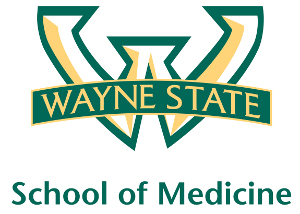Wayne State University School of Medicine
 |
|
| Type | Public |
|---|---|
| Established | 1868 |
| Dean | Jack Sobel |
| Students | 1,000+ |
| Location | Detroit, Michigan, USA |
| Grading | Honor / Pass / Fail |
| Website | WSUSOM homepage |
The Wayne State University School of Medicine (WSUSOM) currently hosts an enrollment of more than 1,000 medical students in undergraduate medical education, master’s degree, Ph.D., and M.D.-Ph.D. programs and courses encompass 14 areas of basic science. WSUSOM traces its roots through four predecessor institutions since its founding in 1868. According to U.S. News ranking, the school ranks 69th in its Research activities, and 85th in primary care.
The Detroit College of Medicine was founded in 1868 in a building on Woodward Avenue. The Michigan College of Medicine was incorporated in 1879 and offered classes in the former Hotel Hesse at the intersection of Gratiot Avenue, Madison Avenue and St. Antoine Street. In 1885, the two schools merged to form the Detroit College of Medicine and occupied the former Michigan College of Medicine building. The college was reorganized and refinanced as the Detroit College of Medicine and Surgery in 1913, and five-years later, came under control of the Detroit Board of Education. In 1933, the Board of Education joined the Detroit College of Medicine and Surgery with the colleges of Liberal Arts, Education, Engineering, Pharmacy, and the Graduate School to form an institution of higher education called the Colleges of the City of Detroit. This was renamed Wayne University in 1934 and became a state-chartered institution, Wayne State University, in 1956. The dean is Dr. Jack Sobel
The School of Medicine’s mission is to provide first-rate medical education while leading the field through research and patient care. The faculty consists of over 2,000 physicians, many who are members of the Wayne State University Physician Group, and provide care at eleven affiliated hospitals, clinics and training sites throughout the area.
Although the school’s faculty offer expertise in virtually all medical fields, the institution’s areas of research emphasis include cancer, women’s and children’s health, neuroscience and population studies. Many are academic leaders at national and international levels in editorial roles. Research highlights in these areas include:
Professors at the school provided the "first evidence that glucose is a major stimulant on insulin secretion and, while and increase in the concentration of blood glucose stimulates the secretion of insulin, a decrease inhibits it and, in addition, stimulates the secretion of a blood-sugar raising factor (glucagon) by the pancreas. Subsequent experiments contributed substantially to the establishment of glucagon as a "second pancreatic hormone."
...
Wikipedia
